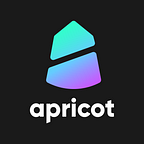Asset-backed Securitization and Bad Debt Processing on DeFi Platforms
An Introduction to Apricot’s Bad Debt Processing Mechanism - I
Bad debt processing remains one of the trickiest issues faced by all DeFi protocols, with traditional financial institutions such as banks often resorting to government assistance to tackle bad debts that they are unable to process. Currently, DeFi protocols often use third-party arbitrageurs to deal with conventional bad debts, but they are still unable to find the most suitable solution to deal with bad debts in cases such as a “Black Swan” event. Leveraging the concept of asset-backed securitization (ABS) commonly found in traditional finance, the Apricot team strives to solve this problem by launching its own special token named COT for bad debt processing.
The main purpose of COT is to fulfill the platform’s commitment to complete the liquidation process within two hours. To illustrate, when the platform has bad debts that cannot be processed by arbitrageurs in time, the platform would purchase these assets at a discounted price and issue COT with these assets as the underlying assets, similar to ABS widely used in traditional finance. The platform also takes into consideration the cumulative amount of bad debts and the overall market condition in order to determine the time of issuance. Referring to past experiences of Compound and other platforms, the increase of COT underlying assets will often take place when the collateral price of the entire platform drops. In this case, if the COT issuance committee considers the market condition as a short-term correction, it will issue COT to share the short-term risk of the platform. On the contrary, if the overall market correction cycle is determined to be long-term, COT will not be issued immediately to protect the rights of investors. Additionally, the platform will be more inclined to cash out the recovered collateral in the secondary market to avoid systemic risk in the platform ecosystem, and the issuance of COT will be delayed accordingly.
During the platform’s initial launching period, Apricot has taken the number of users into account and simulated the total amount of liquidation required with reference to Compound’s “Black Swan” event. Currently, the reserve amount is set at 1% of the locked position. There are two main paths in obtaining the reserves: first would be from the platform’s initial launch tokens, second would be from tokens used to incentivize users. Since the user base is still ramping up in the beginning, there will not be a lot of bad debts needing immediate action. Hence, the circulation of tokens at this stage will not have a significant impact on the fundamentals of the overall circulation.
COT’s attractiveness to investors is two-fold:
(1) The introduction of COT allows ordinary investors to participate in bad debt processing. Traditionally, Compound and other platforms generally rely on professional arbitrageurs in bad debt processing, and their arbitrage process requires high level of professionality. By reducing the bad debt collection process to a simple purchase of COTs, we provide a convenient way for ordinary investors to share the proceeds of bad debt processing.
(2) Investors holding COTs have greater voting weightage when participating in community governance, as they play an important role in the community by helping the community to deal with bad debts effectively.
As such, given our innovative solution to bad debt processing using COT, there will be a greater correlation between the expected volume of transactions and the number of bad debts generated by the platform.
All in all, our team firmly believes that COT should be included as an essential part of the platform’s ecosystem. The use of COT provides a concrete path for the platform to achieve its two-hour liquidation commitment, as well as offers more investors a way to participate in the bad debt collection process. Considering that COT also holds certain special characteristics as a bad debt processing token, the platform will establish a COT asset pool separated from other asset pools to ensure that in extreme cases, changes in the value of COT will not have a systemic impact on the platform’s ecosystem. COT’s contribution towards the platform’s ecosystem will certainly help to build a more holistic DeFi ecosystem. As the current mainstream DeFi platforms do not have a long-term mechanism favored by the mass public to deal with bad debts, the development of the DeFi ecosystem is severely restricted. The launch of COT presents an upfront solution to this problem.
In the next article, we will continue to introduce how the platform protects the liquidity of COT, as well as to elaborate on how the platform seeks to tackle possible risks against COT (such as the decline of underlying assets, the emergence of a bank run etc.). Stay tuned for more updates.
About Apricot Finance
Apricot Finance is a decentralized platform for devolved financial solutions, providing over-collateralized loan protocols to its users. The company provides low liquidation penalties with high predictability in outcome with our project “Apricot Lend”. A 2-hour liquidation guarantee “Apricot Rescue” has also been established to give borrowers security in position clearing within a short time. Our ultimate aspiration is to make Apricot the go-to platform for personalized DeFi solutions, enabling everyone to “Defi the way you Defi”.
Follow our channels and social media:
Website: https://apricot.one/#/
Twitter: https://www.twitter.com/ApricotFinance
Discord: https://discord.gg/C6JrtqZF5U
Telegram: https://t.me/ApricotOfficial
Telegram Announcement: https://t.me/apricotfinanceann
Reddit: https://www.reddit.com/r/ApricotFinance/
